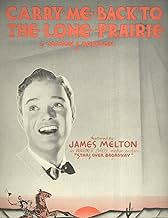Agrega una trama en tu idiomaAl is a down-on-his-luck promoter who is thinking of taking the final bow when he meets singing porter Jan. He sees something in Jan so he signs him to a contract. Al works odd jobs to pay f... Leer todoAl is a down-on-his-luck promoter who is thinking of taking the final bow when he meets singing porter Jan. He sees something in Jan so he signs him to a contract. Al works odd jobs to pay for Jan's singing lessons and drops the idea of Opera when he learns that it will take year... Leer todoAl is a down-on-his-luck promoter who is thinking of taking the final bow when he meets singing porter Jan. He sees something in Jan so he signs him to a contract. Al works odd jobs to pay for Jan's singing lessons and drops the idea of Opera when he learns that it will take years. He has him sing in a nightclub and from there it is up. But Jan soon starts missing les... Leer todo
- John - 'At Your Service, Madame' Number
- (sin créditos)
- Mustached Man at Champ's Table
- (sin créditos)
- Man Wanting Testimonial
- (sin créditos)
- Jim Flugel
- (sin créditos)
- Man in Church
- (sin créditos)
- Charlie
- (sin créditos)
- Listener in Italy Montage
- (sin créditos)
- Man
- (sin créditos)
Argumento
¿Sabías que…?
- TriviaMarie Wilson's first credited screen role.
- Bandas sonorasAt Your Service, Madame
(1935) (uncredited)
Music by Harry Warren
Lyrics by Al Dubin
Played during the opening credits
Also played when Freddy is introduced to Al and Jan at Witmark's
Performed by James Melton, Jane Froman and chorus
The scenario begins at New York City's Madison Square Garden where Al McGillevray (Pat O'Brien), a down-and-out agent in desperate need of cash yet refusing job charities from friends. After a gathering with newspaper reporters at Danceland where he is told he's all "washed up," Al returns to his hotel room with the intentions of ending his life. At that very moment he takes his gun from the drawer, Al encounters Jan Linzimski (James Melton), a singing porter with a pleasing voice and immediately abandons his suicidal tendencies to promote his latest discovery, renamed Jan King. Al sacrifices everything he has for the sake of Jan, working odd jobs and long hours to help pay Senior Minotti (William Riccardi) for his singing lessons, placing him in auditions at talent shows and radio programs where he sings contemporary songs instead of his major preference, opera. In time, Jan makes it to the top of the charts, but with success comes failure after teaming with Joan Garrett (Jane Froman), a singer who leads him to wild parties and heavy boozing causing serious damage to his voice and performances that puts an end to his career on Broadway. Feeling somewhat responsible for his setback, Al makes every effort to bring Jan back to his senses regardless of their serious argument that put an end to their partnership. Adding to Al's worries is Norma Wyman (Jean Muir), a young hopeful from Connecticut wanting a chance at a singing career herself, but because he doesn't want this nice girl to end up like Jan, Al does his best to discourage her while she makes every attempt to succeed, in spite of setbacks and tragedy.
Other featured players include Frank McHugh as "Offkey" Cramer, a song plaguer; Marie Wilson as Molly, a telephone operator and Cramer's love interest; and Frank Fay as the sarcastic radio talent show master of ceremonies whose big encounter of the evening being a group of children called "The Morgan Family." Appearing in smaller parts are Paul Porcasi, Eddie Kane, E.E. Clive, and heavyweight boxing champion, Jack Dempsey, playing himself.
The motion picture soundtrack, with new songs by Harry Warren and Al Dubin include: "Carry Me Back to the Lone Prairie" by Carson J. Robison (sung by James Melton); Guiseppi Verdi's "Aida" (Melton); "Open Up Them Pearly Gates" (sung by "The Morgan Family"); "You Let Me Down" (sung by Jane Froman in a torch song manner); "Coney Island" (sung by quartet); "Where Am I?," "Where Am I?" (both sung by Melton); "At Your Service, Madame" (with Jane Froman, Melton and male chorus); "Ave Maria" (sung by Jean Muir) by Franz Schubert; and "Aida" (finale with Melton).
While Bobby Connolly and Busby Berkeley are given joint collaboration credit as dance directors, only the eight minute "At Your Service, Madame" survives as its sole production number play enacted entirely in song. "September in the Rain" is often credited among the list of songs in STARS OVER Broadway, but is non-existent in the final print. It's reportedly a lavish scale dance number supervised by Berkeley that was either abandoned prior to filming or deleted upon completion.
In spite of occasional revivals on cable television's Turner Classic Movies since its premiere in 1994, "Stars Over Broadway" remains a forgotten item among the list of 1930s Warner Brothers musicals. Whenever it does turn up, it's usually part of TCM's tribute to either Busby Berkeley or tune-masters, Warren and Dubin. Of the three Warners musicals to feature Melton, "Stars Over Broadway" showcases him to best advantage, especially the singing category, but the screenplay, reminiscent to those used in early sound musicals or those produced at MGM whenever its turns dramatic, lacks strength or high points needed to make this something memorable. While Melton and Froman didn't fare well as screen celebrities of Hollywood, they obviously scored better individually whether at the Metropolitan, radio, television, or as stars over Broadway. (***)
- lugonian
- 2 feb 2007
- Enlace permanente
Selecciones populares
Detalles
- Tiempo de ejecución1 hora 29 minutos
- Color
- Mezcla de sonido
- Relación de aspecto
- 1.37 : 1
Contribuir a esta página





































